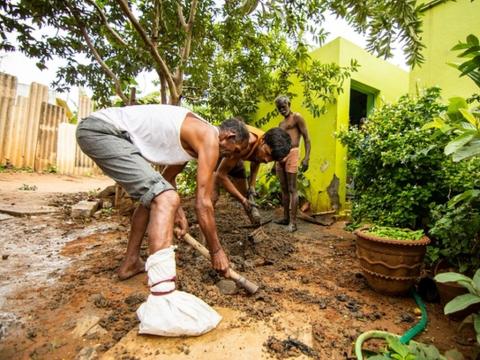By Kemo Cham
Despite providing an essential public service crucial for safeguarding human health, sanitation workers in the developing world face some of the worst condition of living, a new report has revealed.
The report by the World Health Organisation (WHO) revealed that millions of sanitation workers in third world countries are forced to work in conditions that endanger their own health and lives, and violate their dignity and human rights. The report released on Tuesday November 12 also found out that sanitation workers are often the most marginalised, poor and discriminated against members of society, carrying out their jobs with no equipment, protection or legal rights.
“A fundamental principle of health is “first do no harm”. Sanitation workers make a key contribution to public health around the world – but in so doing, put their own health at risk. This is unacceptable,” said Dr Maria Neira, Director, Department of Public Health and Environment, WHO.
“We must improve working conditions for these people and strengthen the sanitation workforce, so we can meet global water and sanitation targets.”
The report, co-authored by WHO, the International Labour Organisation (ILO), WaterAid and the World Bank, was meant to raise awareness of the de-humanising working conditions and to push for change.
The world health agency said in a statement that the study is the most extensive globally to date on the issue, and part of a growing body of work on sanitation workers.
Details of the report reveals that poor sanitation causes up to 432, 000 diarrhoeal deaths annually and is linked to the transmission of other diseases like cholera, dysentery, typhoid, hepatitis A and polio.
Sanitation workers are the people who work in jobs such as cleaning toilets, emptying pits and septic tanks, cleaning sewers and manholes and operating pumping stations and treatment plants.
These people are playing a valuable role in improving the health and well-being of populations around the world and have the same right to good health, said the report’s authors.
The authors said while waste best practices require that waste is correctly treated before being disposed of or used, workers often come into direct contact with human waste, working with no equipment or protection to remove it by hand, which expose them to a long list of health hazards and diseases. All of this happen in the face of working condition that involves informal arrangement, with the workers subject to no rights or social protections. Payment for their work is either inconsistent or it’s not available at all. Sometimes they are paid in food rather than money.
The report highlights four key action points counties and development partners are expected to take into consideration: reform of policy, legislation and regulation; developing and adopting operational guidelines for workers; advocacy and empowerment of sanitation workers to claim their rights; and strengthening evidence on the status of sanitation work and good practice.
WHO says it is helping to strengthen national capacities by focusing on ensuring that protections of sanitation workers are included in national sanitation policies and risk-assessment and management at a local level. It said it would also work with partners to quantify the global sanitation workforce and try to estimate the burden of disease for sanitation workers.
“Many of the challenges sanitation workers face stem from their lack of visibility in society. Few countries in the developing world have any guidelines to protect these workers. Where laws do exist, governments may lack the financial or technical means to implement them, and the informality of the roles presents further challenges,” the WHO release notes.
It adds: “The world will need many more sanitation workers with safe, healthy and dignified working conditions if we are to meet Sustainable Development Goal 6 to bring clean water, decent toilets and good hygiene to everyone, everywhere by 2030. Safe sanitation must go hand in hand with a safe and dignified working environment for those who run and maintain the sanitation services that protect our health.”
Copyright © 2019 Politico Online









